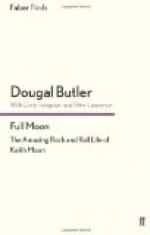Austin put forward this analysis of his brother’s state of mind with a gravity which was in complete contrast with the light airiness of his tea-table gossip, and Barrant felt that he was speaking with sincerity.
“Yes, I can understand that,” he said with a thoughtful nod.
“I think that is what happened in my brother’s case, when he felt called upon to reveal, as he did yesterday, a shameful family secret which hurt him in his strongest point—his family pride.”
“Stop a minute,” interrupted Barrant, in a surprised voice. “I really do not follow you here. What is this shameful secret to which you refer?”
Austin Turold looked surprised in his turn. “It had to do with his marriage and his daughter’s legitimacy,” he slowly replied. “Surely my sister imparted this to the Penzance police inspector, when she besought his assistance?”
“I know nothing about it,” replied Barrant quickly and emphatically. “I shall be glad if you will tell me.”
“Certainly.”
Austin Turold related the story of his brother’s disclosure closure. Again he spoke in careful grave words, and with a manner completely divested of any trace of his habitual flippancy.
“It appears to me that this revelation must have had a very painful effect on Robert’s mind,” he added. “You must remember that he was an abnormal type. An ordinary man would not have made such a disclosure on the day of the funeral of the woman who was supposed to be his wife. But all Robert’s acts hinged on his one great obsession. He allowed nothing to come between him and his one ambition—not even his wife (let us call her so) and child. But it would come home to him afterwards—I mean the normal point of view—the way the world would regard such a disclosure—and I have no doubt that his belated mental anguish and morbid thoughts impelled him to take his life. Understand me, Mr. Barrant, I do not mean that he did this through remorse, but through the blow to his pride. He couldn’t face the racket—the gossip, the notoriety and all the rest of it.”
“But according to your story, your brother had nothing to blame himself for,” said Barrant. “You say that he was ignorant of this earlier marriage until recently?”
“Public sentiment will not look at it that way. People will say he sacrificed a dead woman and his daughter to his own selfish ends—threw them over when he had attained his ambition. That’s what came home to him, in my opinion.”
“I see.” Barrant was silent for a while, turning this over in all its bearings. “Yes. There may be something in that point of view. But did not your brother confide this story to you before yesterday?”
“When we were alone together during the last few days he frequently seemed on the point of telling me something. I could see that by his manner. But he never got beyond a certain portentousness, as it were. It’s my belief now that he wanted to tell me, but couldn’t quite bring himself to it. I am very sorry that he didn’t.”




